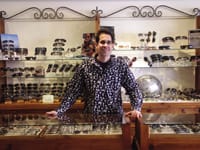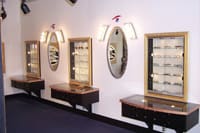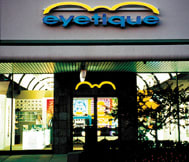Training
Strategies
Focused training plans for new hires--and continued schooling for current employees--keeps the art of high-end optical sales going strong
By Erinn Morgan
The presentation of luxury optical products is best done by a knowledgeable and experienced salesperson. Do you have one or more of these on your staff? If so, consider yourself lucky as some say this is a breed quickly becoming extinct in the ever-competitive high-end marketplace.
|
|
|
|
Above Top: New employees are teamed with someone who has been selling for a long time at Marc Michel Eyewear Studio in Los Angeles. Bottom: Marc Michel owner, Scott Mischel, is on duty |
|
"There are fewer and fewer optical salespeople who appreciate high-quality frames," says Vincent Dagron, OD, owner of See Comme Ca optical shop and 123 Eyewear, a high-end wholesale frame business, both based in Oakland, Calif. "Some opticians I deal with can tell you if a frame was made in China or Italy, but many cannot. If opticians can't tell the difference anymore, then how can they convey it to the customer?"
The root of the issue boils down to training--or a lack thereof--of opticians and optical employees in the U.S. "People aren't trained well because there is no one to train them," adds Dagron, whose wife, also an optometrist, runs their retail shop. "In the U.S., the only good ones are the older generation, and they are 50 to 60 years old."
The resolve to this growing concern is a greater focus on training for employees both new and old. Without this aspect to your business, other efforts to grow your bottom line may not be successful. "You can advertise your shop in the paper, but if customers walk through the door and get lousy service, what good is that?" asks Norman Childs of Eyetique, a chain of three high-end stores in Pittsburgh, Pa. "If you spend the money on advertising, you have to spend money on training."
Here, we offer up some programs and training tips to get you jump-started.
MENTORING SYSTEMS
The first step to training new employees is pairing them up with an experienced salesperson. "We like them to work alongside someone who is a proven entity--somebody who's been doing it for a long time," says Ivan Samuels, owner of Eye Gallery, a chain of six high-end stores in the Atlanta area. "We like them to have a lot of personal attention, one-on-one."
The benefits of this system are many. Seasoned employees can impart their knowledge to the new hire, as well as the store's sales and customer service philosophies. New employees can watch their mentors in action before venturing out on their own.
If an optical boutique is smaller, many owners will handle the training of new employees themselves. "I am very particular about how people are handled and treated--I will be involved in nearly every sale, every customer, and every transaction," says Scott Mischel, owner of Marc Michel Eyewear Studio in the Pacific Palisades shopping center in Los Angeles. "We pair new employees with someone who's been selling for a long time, but most likely that will be me."
Since selling technique, product assortment, and customer service will take time to master, start with the basics. "We start off spending a day or two discussing the mechanics of how sales get done--how we collect the information, and generally how we do things," says Samuels. "Everything is computerized, so we need to know that they can write up a sale."
|
|
|
|
Pairing seasoned and new employees is primary in the training plans at the Eye Gallery, a six-store, high-end chain in the Atlanta area |
PRODUCT TALK
Once the basics have been discussed, it's time to move into learning the products and lines. This provides a basis for what they will discuss with customers.
"My approach is to make them familiar with the products we carry," says Mischel. "We carry about 15 lines, and I will discuss the image and philosophy of each."
He also explains the importance of finding the glasses and sunglasses that fit the customer's face and personality. "I tell them to sit back and look at the person. I encourage them to talk to the person and develop a relationship."
Eye Gallery's Samuels also discusses the products with new hires right away. "We talk about why we feel certain products are great. No matter what they did before; they need to fully understand the nature of what we do and why we sell these products."
Experience in the optical field isn't everything, Samuels says. "Sometimes simply being an optician is not enough. They have to understand the difference between a moderately priced frame they sold elsewhere and something we sell that is very special."
This process can be time-consuming for both the teacher and the student. But the time spent will be well worth it in the end when the new employee understands your product philosophy.
PHILOSOPHICAL FOCUS
It is important to impart your philosophy to employees at the beginning, when they are fresh and open to new techniques. Once informed, they will more easily assimilate into your system.
Here are some examples of specific ideas retailers pass onto their trainees:
Provide opinions. "I teach them to ask for a second opinion from other employees on a pair of glasses for each customer," says Eddy Mamelok, owner of 20/20 Optical, which has two locations in Greenwich and Old Greenwich, Conn. "A lot of salespeople won't do that because they don't want to jeopardize the sale. But we just want them to have the best eyewear for them. The best advertising 20/20 Optical could ask for is if people leave with a great pair of glasses."
Create a positive spin. Another tactic Mamelok recommends comes into play once the sale is made and the customer is ready to walk out the door. "The best thing to say is simply 'Enjoy your new glasses.' They will be back if there is a problem. Saying this is such a simple thing and yet such a positive thing."
Love your customers. At Eye Gallery, Samuels instills a strong value for personal service. "We have a strong customer service reputation," he says. "This format really works for us."
Mamelok also notes the importance of customer service as a key element to teach new salespeople. "This customer has to be treated well and catered to in a certain way. You can't be high-end and not be customer service-oriented."
|
|
|
|
Eyetique's new hires go out onto the sales floor right away and are shadowed by mentors and in turn shadow their mentors to get a true idea of how the dispensary is run |
|
FLYING SOLO
When is a new employee ready to hit the sales floor running? The verdict on this varies from immediately to a few weeks down the road. Mamelok says he only hires people with a lot of experience, so training is not as extensive before they can begin selling. "We pay very well and I am picky, so we get good people," he says. "I would put them out there right away but keep an eye on them. Still, there are a lot of different sales techniques--I can teach them what they don't know."
Childs says he also believes in sending new hires out onto the sales floor right away. "We put them out there immediately," he says. "We monitor and shadow them and they shadow us. We critique them and tell them what they are doing wrong and right. A lot of people start with us and don't make it here."
Others keep new hires under supervision for a much longer time period. "I would feel comfortable letting them deal with somebody on their own after a month," says Mischel.
LIFELONG LEARNING
The training process continues even when the new employee is selling. "It really even takes someone who is an experienced optician a few months to get the gist of things," says Samuels.
Savvy dispensers continue training their employees on new sales techniques and making them knowledgeable about new products. It is this strategy that gives some retailers an edge in a challenging marketplace. "I continue to teach them about our new products," says Mamelok.
Education should be a daily part of life in a dispensary, adds Mischel: "It is an ongoing process. Whatever person walks in the door, whether it is a big sale or a small sale or a lost sale, there is always a discussion afterwards with the staff as to why that happened."
|
The Right Stuff |
Good help is hard to find--and harder yet to keep. This is especially true for the optical industry, where many employees view the vocation as a temporary or part-time job. In this situation, you usually get what you pay for, and those high-end shops willing to invest in their sales staff often get quality, long-term people. Retailers turn to a variety of sources when looking for employees. "My store is in a small neighborhood, and 95 percent of the people I sell to live in my community," says Mischel. "I usually find employees who are local and are looking for full- or part-time jobs in retail. It's great because they know the people in the community." Some dispensers also look for people fresh out of opticianry school while others search for industry veterans. "We would not think about taking somebody straight out of school--that is not something we do" says Samuels. "Some shops try to do it to keep costs down." The one thing most agree upon is that the personality of the individual is key. "We either take an experienced optician or someone who has a great personality and works well with customers, and we will teach them our way of what we do," says Samuels. Many optical shops also look for a strong salesperson. "I don't care how you cut a lens, I am looking for somebody who can sell," says Eyetique's Norman Childs. "We do hire people who are opticians, but prefer to hire those from a high-end jewelry or clothing store. We like them to eventually become a certified optician, but they can do this while working with us. If you understand the concept of high-end, fashion, and sales, you are most of the way there." Finally, an affinity for high-end products is also key. "I don't necessarily look for somebody with experience," says Mischel. "I just basically look for someone who appreciates high-end eyewear." |









